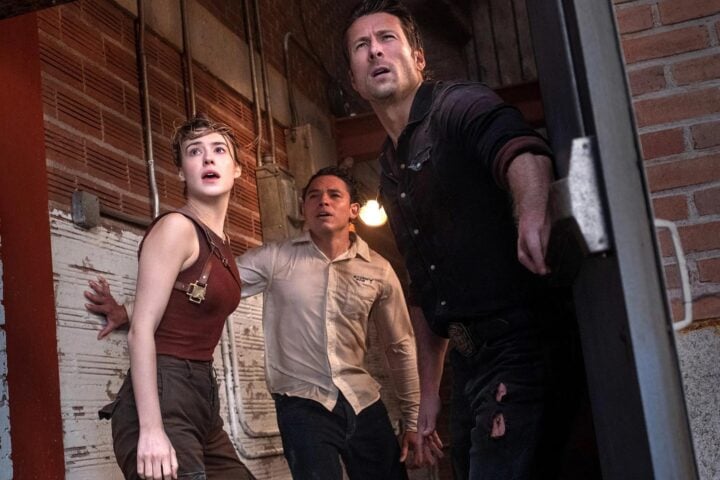Writer-director Skinner Myers’s The Sleeping Negro opens with a quote from James Baldwin: “To be a Negro in this country and to be relatively conscious is to be in a rage almost all the time.” That rage is embodied in the film by a thirtysomething black Man (played by Myers himself), whom we first glimpse in a dreamlike state, inexplicably levitating above his bed as the camera slowly creeps into his Los Angeles loft. Straight away, Myers’s first narrative feature announces its leanings toward the abstract and often surreal, even as its blistering commentary remains firmly rooted in our present reality.
Once awake, Man is called into the corporate real estate office where he works, even though it’s his day off and his birthday. His Boss (David Fumero) wants him to backdate and file a court document in order to evict a low-income tenant from her house on the site of a potential new development. Man bristles at committing this fraudulent act, but Boss is quick to remind him that his position at the firm hangs in the balance. This scene is at once mordantly bleak and queasy: Boss, who’s white, opens the meeting by sanctimoniously gifting Man with a rare, signed copy of Kenneth B. Clark’s The Negro Protest. It sets the stage for an odyssey where Man is no longer able to reconcile his blackness within a white society that engulfs his being.
Back at Man’s apartment, The Sleeping Negro introduces further characters to engage its protagonist in a series of deliberately heightened and racially charged conversations. First, his black childhood Friend (Nican Robinson) arrives unannounced and what begins as a happy reunion quickly sours when he reveals himself to have converted into a born-again Christian and Trump supporter. A little later, Man’s fiancée, White Woman (Julie McNiven), drops by before he’s due to meet her parents that night and her archness toward the discomfort he feels in their interracial relationship pushes him even farther over the edge.
Myers’s dialogue is caustic and direct in these sequences, and he shows equal scorn for black Republicans and white liberals, what with Friend and White Woman similarly espousing the idea of a post-racial society and a “pull yourself up by your bootstraps” mentality. “Can you just for one day not point out the color of your skin?” chides Man’s fiancée, while simultaneously fetishizing his body and pestering him for sex. As Man’s anger builds and everyone around him continues to laugh it off, our hero begins to suffer a psychic split resulting in the intrusion of an unsettling doppelganger into his periphery.
As befitting its title, The Sleeping Negro adopts an illusory aura throughout, aided by vibrant 16mm photography and a trancelike score. It’s clear that Myers is indebted to the aesthetic stunts performed by American auteurs like David Fincher, Christopher Nolan, and Darren Aronofsky at the turn of the century (a few Tyler Durden-esque subliminal flashes here, some dizzying SnorriCam shots and reversed footage trickery there). And yet, all of these potentially gimmicky points of reference coalesce into a wholly immersive audiovisual experience that elicits a sense of impending doom throughout, especially once Man’s journey segues into a more explicitly nightmarish showdown with his doppelganger as night falls.
The Sleeping Negro does break up its consciously suffocating mood with a streak of absurdist wit, as in the thread about an unexplained black eye that Man sports throughout, which he casually trots out a different explanation for each time he’s asked about it. Man’s extended fight with his fiancée also toes the line of full-on farce as they continue to argue about her dismissal of white privilege while he sits on the toilet. Yet in many of these ostensible moments of levity, Myers displays a mastery at abruptly switching tones, as when this bathroom confrontation ends in a shockingly vile, but entirely apt, proclamation.
As Man becomes tangled in one fraught scenario after another, Myers throws in so many contentious ideas into the film’s mix that it almost begins to spiral out of control. But The Sleeping Negro unequivocally snaps into direct focus for its climactic sequence. Man carries out his corporate duties and files the fraudulent paperwork for his Boss and accompanies a Sheriff (Tunde Adebimpe) to evict the low-income tenant, a sickly older Black Woman (Rae Dawn Chong), from her home. Adopting a stern bureaucratic persona to explain to the confused and distressed woman that her payments have lapsed, Man faces the unavoidable truth that by buying into a game that was always rigged against him, he’s ultimately become a pawn for white forces to inflict further damage on disadvantaged black citizens.
“It is not the strongest or the most intelligent who will survive but those who can best manage change.” That misquotation from Charles Darwin’s Origin of Species is parroted to Man several times throughout The Sleeping Negro, and by the end, the film cogently conveys the notion that white supremacy has adapted to any perceived notion of progress or racial equality by giving black Americans a mock authoritative role to play in their own subjugation. With the film literally ending right where it began, Myers makes it abundantly clear that until the entrenched systems that rule our lives (whether in government, business, or art) are completely dismantled, the interminable slumbering will persevere.
Since 2001, we've brought you uncompromising, candid takes on the world of film, music, television, video games, theater, and more. Independently owned and operated publications like Slant have been hit hard in recent years, but we’re committed to keeping our content free and accessible—meaning no paywalls or fees.
If you like what we do, please consider subscribing to our Patreon or making a donation.





